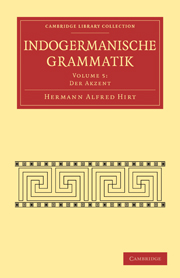Book contents
- Frontmatter
- Vorwort
- Contents
- Einleitung
- Erster Teil. Der Akzent der Einzelsprachen
- Zweiter Teil. Der Akzent des Indogermanischen
- XVI Kapitel. Die Intonation (der Silbenakzent)
- XVII Kapitel. Derindogermanische Wortakzent (Hauptton)
- XVIII Kapitel. Typus mit wechselndem Ton
- XIX Kapitel. Nomina mit festem Ton
- XX Kapitel. Betonung der Adjektiva
- XXI Kapitel. Adverbium. Zahlwort. Pronomen
- XXII Kapitel. Betonung des Verbs. Vorbemerkungen
- XXIII Kapitel. Die einzelnen Betonungstypen des Verbums
- XXIV Kapitel. Der zweite Betonungstypus
- XXV Kapitel. Der dritte Betonungstypus
- XXVI Kapitel. Der Satzakzent. Vorbemerkungen
- XXVII Kapitel. Enklise und Proklise
- XXVIII Kapitel. Betonung der Wortgruppen
- XXIX Kapitel. Die weitere Satzbetonung
- Autorenverzeichnis
- Sachregister
- Wörterverzeichnis
XXVII - Kapitel. Enklise und Proklise
Published online by Cambridge University Press: 05 August 2011
- Frontmatter
- Vorwort
- Contents
- Einleitung
- Erster Teil. Der Akzent der Einzelsprachen
- Zweiter Teil. Der Akzent des Indogermanischen
- XVI Kapitel. Die Intonation (der Silbenakzent)
- XVII Kapitel. Derindogermanische Wortakzent (Hauptton)
- XVIII Kapitel. Typus mit wechselndem Ton
- XIX Kapitel. Nomina mit festem Ton
- XX Kapitel. Betonung der Adjektiva
- XXI Kapitel. Adverbium. Zahlwort. Pronomen
- XXII Kapitel. Betonung des Verbs. Vorbemerkungen
- XXIII Kapitel. Die einzelnen Betonungstypen des Verbums
- XXIV Kapitel. Der zweite Betonungstypus
- XXV Kapitel. Der dritte Betonungstypus
- XXVI Kapitel. Der Satzakzent. Vorbemerkungen
- XXVII Kapitel. Enklise und Proklise
- XXVIII Kapitel. Betonung der Wortgruppen
- XXIX Kapitel. Die weitere Satzbetonung
- Autorenverzeichnis
- Sachregister
- Wörterverzeichnis
Summary
Allgemeines. Die griechischen, römischen und indischen Grammatiker berichten uns von Wörtern, die sich in ihrer Betonung an ein anderes anlehnen (ἐγκλίνειν). Das kann geschehen, indem sie sich an ein vorhergehendes anschließen (Enklise) oder an ein folgendes (Proklise). Der Enklise sind vor allem die Partikeln unterworfen, dann die Pronomina. Aber bei den Griechen sind auch Verben enklitisch, was auch die indischen Grammatiker berichten, und im Indischen sogar der Vokativ. Enklitische Wörter sind natürlich auch schwach betont, sie haben meist eine geringere Bedeutung als vollbetonte, aber sonst unterliegen sie keinen Veränderungen.
Wären wir allein auf die Angaben aus dem Altertum angewiesen, so würde uns nur ein geringes Material zur Verfügung stehen. Unsere Kenntnis ist aber durch den außerordentlich bedeutsamen Aufsatz von Wackernagel, IF. 1, 333 erweitert worden, in dem er feststellt, daß die enklitischen Wörter nach der zweiten Stelle des Satzes streben. Umgekehrt werden Wörter, die sich ausschließlich oder überwiegend an zweiter Stelle finden, enklitisch sein.
Ganz besonders zeigt sich die Enklise daran, daß das enklitische Wort selbst eng zusammengehörige Worte trennt, sich also mit aller Macht an die zweite Stelle schiebt.
So finden wir z. B. gr. ποῖόν σε ἔπος ϕύγεν ἕρκος ὀδόντων ‘welch ein Wort’; Horaz, Od. 1, 3, 3 ventorumque regat pater; 1, 8 per omnis t e deos oro; got. ga-u-saíhviþ; Goethe: was ich von der Geschichte … nur habe auffinden können.
- Type
- Chapter
- Information
- Indogermanische Grammatik , pp. 329 - 369Publisher: Cambridge University PressPrint publication year: 2009First published in: 1929



